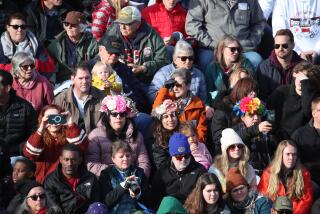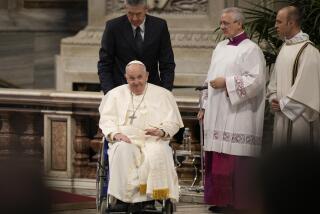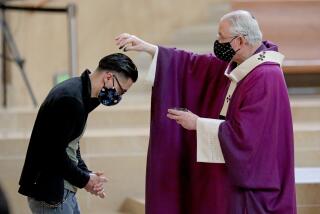THE PAPAL VISIT : Heat, Crowds at Masses Worry Health Officials in Texas, Miami
- Share via
SAN ANTONIO, Tex. — On the edge of the city, the sun beats down on a dusty site where workers are preparing the massive altar.
This is where Pope John Paul II will celebrate his third and perhaps largest open-air Mass during his American tour. An estimated 500,000 people are expected to converge on this treeless site Sunday.
The expected heat and the size of the crowd has people worried, not only in San Antonio but at sites all along the Sun Belt where there will be open-air Masses. The very old and the very young are being urged not to attend the Mass. One former San Antonio health official has predicted a number of deaths. (The two open-air Masses in Los Angeles on Sept. 15 and 16 at the Coliseum and Dodger Stadium will be held in the evening.)
San Antonio’s former health director, Katharine Rathbun, left her job several weeks early in a symbolic protest of what she viewed as inadequate precautions being taken by organizers of the Mass. She warned that dozens of people could die from the heat and overcrowded conditions. Event organizers, however, say they are well prepared.
In New Orleans, Laverne McDow, a spokeswoman for the archdiocese, also went so far as to say that there very well could be deaths at the open-air Mass there.
“Of course we will have deaths and emergency situations,” she said. “But that’s statistics, isn’t it? We hope no such tragedies occur, but it will be a large crowd and we don’t know what the weather will be like.”
In Miami, where the Pope will say his first Mass of the American tour Friday, health officials said they are concerned about both the heat and their inability to predict the size of the crowd that will turn out.
“Heat exhaustion may be our largest concern,” said Harold Rogers, division chief of the Metro-Dade Fire Department. “Some of the people will be on the site after daylight and the Mass is over after 1 p.m. The temperature could be about 90 degrees with the humidity somewhere around there. You and I could stand it all right, but maybe not our mothers and grandmothers.”
While there is concern at all three sites about the effects of the heat and crowding, religious and civic officials have taken steps to alleviate problems. The most vocal is Father David Garcia, site chairman for the San Antonio Archdiocese. Mass organizers were stung by the former health director’s predictions of multiple deaths.
“It’s greatly organized,” Garcia said. “We’re into overkill” in taking safety precautions.
Garcia said he did not anticipate Sunday’s Mass being anything similar to outdoor rock festivals in which fatalities have occurred.
“We don’t have a rock concert on our hands, we have a Mass,” he said. “They’re there to worship. They pray, they sing, they listen. This is not entertainment, this is worship.”
Precautions Taken
Garcia, the secretary of Archbishop Patrick Flores, said there will be 36 first aid stations and that each will have running water. He also said the Kroger Co. is providing 40 water booths and that, among other precautions, those planning to attend the Mass are being asked to take their own drinking water.
“We’ve got two times the amount of water we need even under the strictest health standards,” he said.
Dr. Fernando Guerra, San Antonio’s interim health director, said traffic into the Mass site will be halted and some people turned away if the weather is unusually hot.
One unknown in the preparations is how many Mexican nationals will travel across the border to attend the Mass. Estimates have ranged as high as 200,000, but the Immigration and Naturalization Service has maintained that it will do little more at border checkpoints than staff them as it would on a holiday.
In New Orleans, a local bottling company delivered 75,000 gallons of water and 700 cases of cups to the site of the papal Mass. Like San Antonio and Miami, the land will be divided into sections using ropes and stakes as a means of keeping the crowd evenly distributed. The Louisiana National Guard will staff first-aid sites and there will be one air-conditioned hospital.
The half-square-mile park in Miami will have 11 first-aid stations, an infirmary, ambulances, three-wheeled rescue carts and paramedic teams roaming through the crowd. Steven Hoffmann, the Dade County Health Department’s food hygiene coordinator, warned that there could be problems with food poisoning because of improper food handling and the heat. He cited the liquid frozen eggs used in making sandwiches as the kind of food that could spoil easily.
“We’re not totally thrilled about the eggs,” he said.
More to Read
Sign up for Essential California
The most important California stories and recommendations in your inbox every morning.
You may occasionally receive promotional content from the Los Angeles Times.










